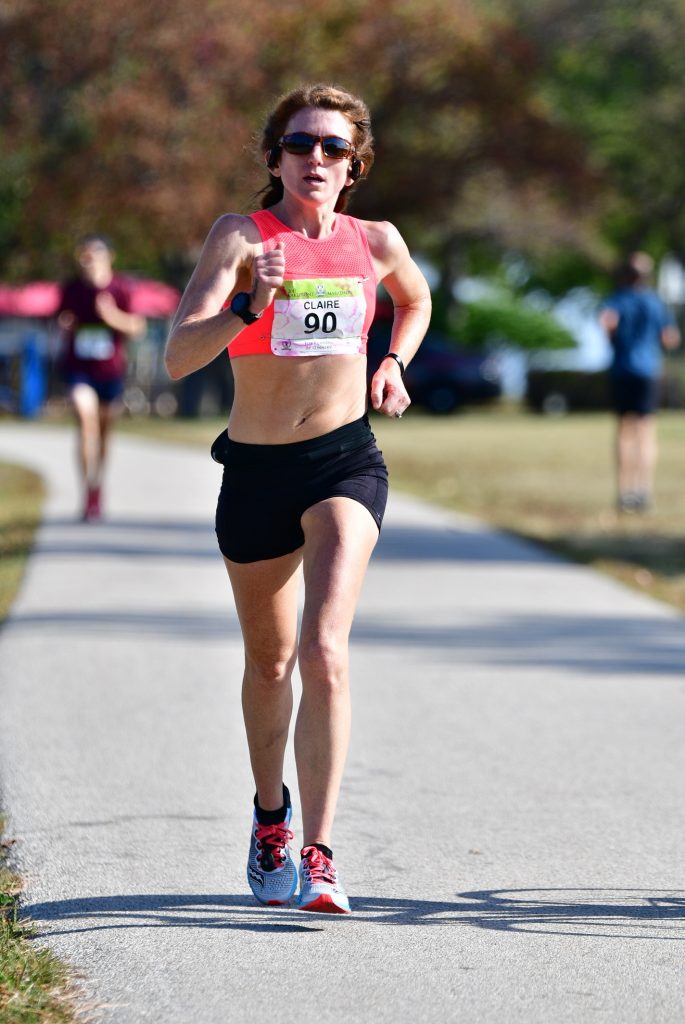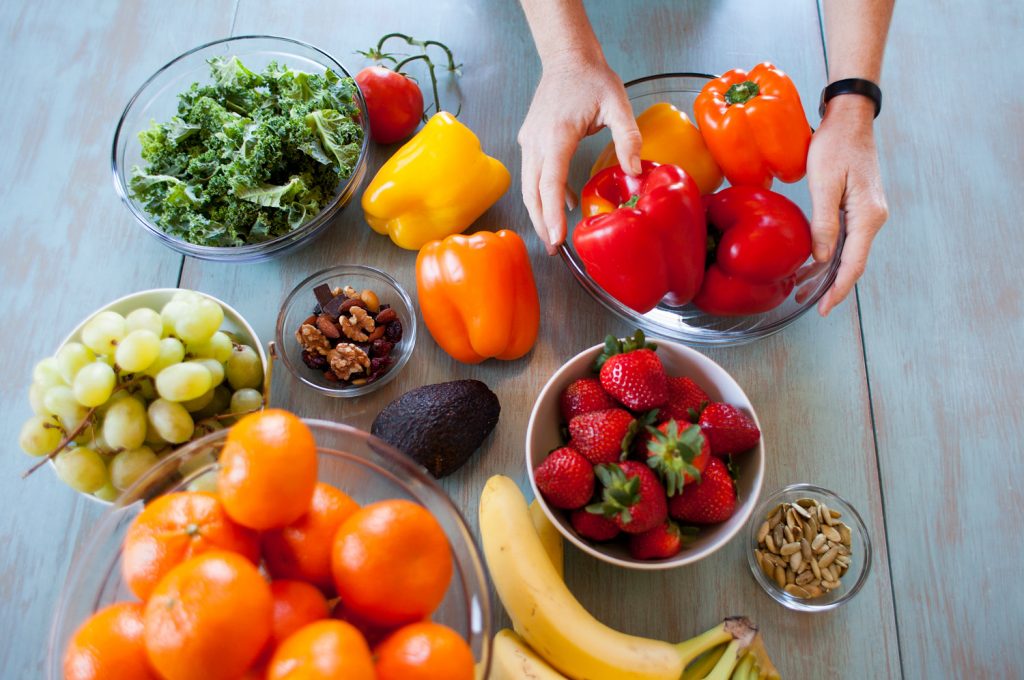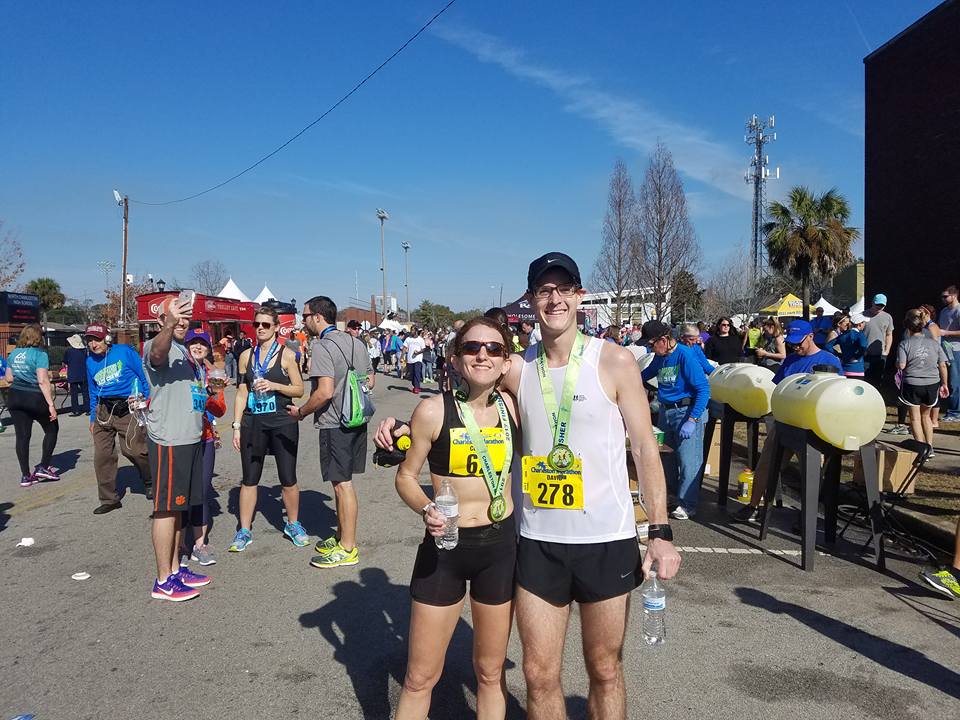Proper fueling for the marathon can be the difference between the race of your life and a disaster. By learning exactly what your body needs to power through the race, you can come up with a fueling plan that you can rely on to run your best race yet!
I’ll go into the details of what to eat and how much to eat, but please note that you do not have to count calories or macros to be successful at your marathon fueling! Tracking can be helpful occasionally to get an idea of what you are eating, but I don’t recommend it long term.

Race Week Fueling
It’s not only race day that you need to consider. The week before your race is just as critical to your success.
In general, you want to decrease calories slightly, while keeping up the carbs. Because you are running far less in taper week than you did in training, you won’t need as many calories.
A mistake many marathoners make is not easing up on how much they eat even though they are burning significantly fewer calories. Definitely eat when you are hungry, but be conscious of eating a little lighter.
Your nutrition goal during taper is to load up your muscle glycogen stores, without gaining fat from eating more and running less. You should actually gain weight during taper, but ideally that’s from the extra glycogen and water that you are storing, not fat. Having plenty of fuel and hydration stored inside your body before the race is the goal! Don’t be alarmed if you gain 2-4 pounds while carbo-loading.

Carbs are Your Friends
The goal for carbohydrates should be to maintain a daily intake of 3-5 grams per pound of body weight. For a 150-lb athlete this will be approximately 450-750 grams (1800-3000 calories).
That is a lot of calories and a big range, so be sure to find a number that is relative to your overall caloric needs, based on body size and how much you run.
Protein is Still Important
While you are loading up on carbs, don’t forget about the protein. Protein is needed to repair and reverse muscle damage and fatigue resulting from all your training. Athletes need more protein than sedentary people so your goal is approximately 0.6-0.7 gram per pound of bodyweight. Going back to our example of the 150-lb athlete, this would be 90-105 grams of protein per day.
This can easily be achieved by having a couple of servings of protein-rich foods.
Many of your carb sources, like grains and beans, provide protein as well. One serving of pasta has about 42 grams of carbohydrate and 7 grams of protein. One slice of whole-grain bread has about 20 grams of carbohydrate and 4 grams of protein.
What About Fat?
In order to decrease calories but keep up carbohydrate intake you will have to trade some of the calories coming from fat for more carbohydrates. Good fat should still contribute 20-25% of your total daily calories, but since you will be eating fewer calories this will mean fewer total grams from fat.
A few examples of some swaps you can make to cut down on fat and increase carbohydrate:
- Pancakes with maple syrup instead of avocado toast
- Pasta with tomato sauce instead of creamy sauce
- Veggie salad with an extra dinner roll and vinagrette instead of full-fat dressing
- And my favorite: an extra plain baked potato with salsa or ketchup instead of fatty toppings
Taper off the Fiber
While fiber is an essential part of any healthy diet, you’ll want to taper off high-fiber foods as you get closer to race day.
Foods like white rice and potatoes are perfect in the two days leading up to the race to be sure they are easily digested.
Pre-Hydration
Now let’s talk about hydration. We know that dehydration can significantly impair performance, but it is preventable with adequate hydration in the weeks, days, and hours leading up to the race.
To ensure you are properly hydrate, sip on fluids throughout the day. Water is sufficient, but juices and sports drinks can help meet your carbohydrate needs if you are struggling to get all your carbs from food. Adding salt and other electrolytes to your water or adding a little extra salt to your food can also help you retain water, which is normally a bad thing, but it’s a great thing for marathoners.
Hydration needs are drastically individual, so there’s no magic number that’s right for everyone.
Drink when you are thirsty, but be sure that you are urinating every 2-3 hours and your urine should be pale yellow. If it is darker, then hydrate more. If it is clear, you may be hydrating too much. Overdrinking is a real issue for marathon runners so don’t overdo it.
The Day Before the Race
The day before the race, it’s smart to avoid alcohol. This might seem obvious, but even a small amount of alcohol can lead to dehydration and poor sleep quality. Not what you need right before the big day!
You’ll want to eat your biggest meal at lunch, not at dinner. Yes, it’s a common tradition to have a big pasta dinner the night before the race, but eating this meal earlier in the day allows plenty of time for digestion. You don’t want to be uncomfortably full on race morning so try eating a big meal earlier and a normal size meal the night before.
Always choose foods you’ve had before. Now is not the time to try a new type of pasta or sauce just because you are in a new town and heard about the great reviews. It could come back to haunt you!
My favorite pre-race dinner is a plate of plain potatoes with ketchup. I could rely on that anywhere I traveled and I knew that it would sit well with my stomach the next day!
Race Day
Alright, race day is here. The first rule of racing is NOTHING NEW ON RACE DAY, so this should be a routine you have practiced many times before.
Breakfast
Be sure to eat breakfast 2-3 hours before the start. Eating breakfast is important because a small meal rich in carbohydrates will help prevent hunger and maintain a normal blood sugar level. Stick with foods that are familiar and those you have been eating throughout your training. If you enjoy coffee, it can be a performance booster and it can help things move along your digestive system, so you can use the bathroom in the comfort of your home or hotel and not during the race!
You’ll want to sip on water or a sports drink, but again, not so much that you need to use the bathroom during the race. I prefer to get my fluids in early and not drink anything in the hour before the gun goes off.
During the Race
There are many different products on the market that can fuel the marathon. I’ve got several recipes you can try if you like to make your own fuel:
I’ll go over the traditional approach with gels and sports drinks, but any product containing quick digesting carbohydrates can fuel your marathon.
Some runners take a gel 15 minutes before start time and others prefer to wait a bit to fuel. It’s often better to take small doses of fuel more often instead of bigger doses less often, and I recommend that you are taking in something every 30-40 minutes.
Rough guidelines are 30-90 grams of carbohydrates per hour from a combo of gels and sports drinks, which is about 150-350 calories per hour. Bigger runners need more and smaller runners need less.
The good thing about using sports drinks is that they also contribute to your hydration, but the bad thing is that they might be hard on sensitive stomachs, so be sure you are taking in water as well.
Most people can only digest 60g of carbohydrate per hour so more isn’t better, because it could make you feel sick. That’s why a steady intake throughout the race can help while avoiding blood sugar crashes.
It’s important to know that anything you take in during the last 20-30 minutes won’t reach your system in time to be effective. BUT, it might be worthwhile to swish something sweet in your mouth and spit it out, especially if you can’t handle any more in your stomach at any point. Just the motion of swishing alerts the brain that carbs are coming so you do get a bit of a boost. But in general, stick to water near the end of the race.

After the Race
After the race, it’s time to celebrate! You’ve worked hard and you have my permission to eat and drink ANYTHING you want!
Of course, it is a good idea to replace what you’ve lost during the race, which is primarily fluid, carbohydrate, and electrolytes. And you’ll want to start to repair the damage you’ve done to your muscles with a good helping of protein. Many runners aren’t hungry right away, so try to drink what you can and fuel when you are ready.
My favorite post-marathon food is a big, salty serving of french fries and an ice-cold drink!
The Best Plan is Unique to You
Like most things running, you will have to use trial and error to figure out exactly what works best for you when deciding how to fuel for the marathon. You’ll want to practice your fueling and hydration plan as often as you can during your training, on both long runs and on speed days so your tummy is trained to handle it. The fewer surprises that happen on race day the better, so once you find out what works stick to it.
How about you? Do you have your nutrition dialed?
Fueling properly for the marathon can make the difference between an incredible race and a terrible one, so I hope this guide has helped put you on the right track for your best race yet!

